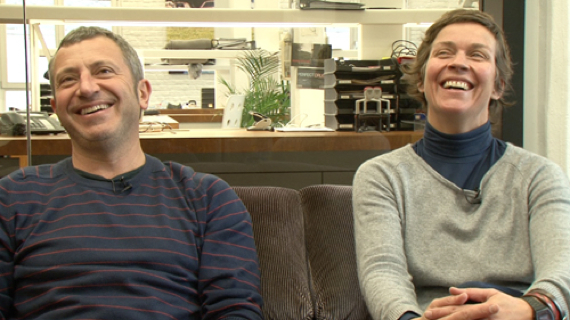Koen Mortier and Eurydice Gysel • Producers
“It has become very difficult for young directors to find a job”
by Anne Feuillère, Cinergie.be
- Cinergie speaks to Koen Mortier and Eurydice Gysel about their work as producers and their production companies

This grand open space made out of concrete and glass bears little resemblance to the disorder and the warmth of the former CCCP. We are surprised, but Koen Mortier, one of the two producers at CCCP, explains: “It was our former manager who created all this. It's not practical, it's a bit annoying... That's why he was sacked!” he adds laughingly. And from that moment on, it was Eurydice Gysel, the other right-hand person of this Flemish production company, who began to manage it all. We sat down with both of them to talk about their work as producers.
Cinergie: You are both producers not just at CCCP, but also at Epidemic and Czar. What are the differences between these three production companies?
Koen Mortier: It's still a bit difficult for us to find ourselves back here (laughs). With CCCP, we have created a production company dedicated to fiction, for young filmmakers who had come from advertising but actually wanted to start making their films. And then, as the market has changed during the economic crisis, and since it has become very difficult for young directors to find a job, we have changed our focus, with Czar, to concentrate on production in the advertising industry. Regarding Epidemic, well, that's just a matter of a name really... CCCP is a difficult enough name to remember. Whenever we were at a film market to present and defend a project, people often took us for a Russian company. That's why we decided to use this name, Epidemic, as some sort of “label”. But now it seems like that's made it even more confusing! Nobody seems to identify with it! Our goal is for it all to become Czar, bit by bit, which at the moment is mostly focusing on TV productions.
What made you create CCCP back in 2002?
KM: At the time, I was one of the partners at Czar, and I wanted to launch a production outfit dedicated solely to fiction.
Eurydice Gysel: For my part, I had started working at Czar in 2000, in advertising. And in 2005, we decided that I was going to produce or help to produce Ex Drummer [+see also:
trailer
film profile]. That's how we started developing fiction films. I stopped working for Czar and in advertising in 2004, and from that moment on, I made myself available for advertising work on a freelance basis. I started working on fiction films with Ex Drummer. With this film by Koen, we immediately visited lots of festivals and co-production markets. And with his new project, we found ourselves again at CineMart, the co-production market of the International Film Festival Rotterdam, and everything has gone really quickly. At the same time, we decided to help directors who were working at Czar when they wanted to direct short fiction films, in order to create their portfolios and dossiers, or support their projects. That's how we ended up producing Toon Aerts' short film Perfect Drug, which is currently doing the rounds at a load of festivals. We meet people whose work we really like, and we support them. But it's mostly Koen as artistic director of our organisation. You are the one who is most interested in stamping a hallmark on the films.
KM: In the beginning, I wanted to create the same thing I did with Czar: a production outfit with a true hallmark or signature, one that produced very personal advertising films, with genuine artistic ambition. That explains why it has become a company consisting of directors and not just a firm consisting of producers. And this is, I believe, one of the main things that make Czar stand out in Europe, because other European production companies, like Caviar, still revolve around producers. They are the ones who make all the decisions and who look for the directors. So I wanted to create the same thing within the fiction domain, really gathering a team of directors who get along well, without necessarily having the same ideas, but with somewhat comparable artistic ideas, where everybody understands one another. […]
Read the rest of the interview on Cinergie (in French).
(Translated from French)
Did you enjoy reading this article? Please subscribe to our newsletter to receive more stories like this directly in your inbox.















